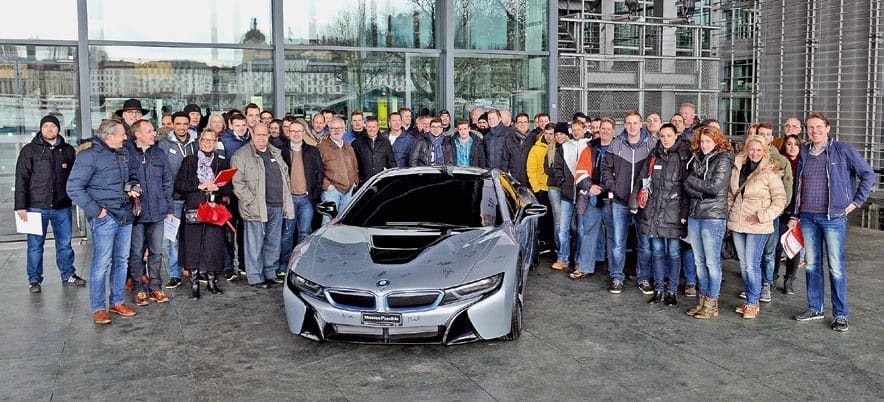Not customers, but fans
The automotive industry - perhaps more than other industries - is strongly characterized by cut-throat competition. Not only do the brands compete with each other, but there is also competition within the brands. If you want to survive in this environment, you need more than just good products and good sales. Since 2008, BMW's own retail operation in Dielsdorf has been pursuing this path.

Wf you're looking to buy a BMW or a MINI, the trip to Dielsdorf at the eastern foot of the Lägeren might well be worthwhile. That's where you'll find a motivated team of around 130 employees who accompany customers along the entire customer journey.
Embattled automotive industry
The company has been in existence since 1995, having originally emerged from MOTAG, a car dealership founded in 1938 that has been the general importer for BMW since 1953. In 1975, the BMW Group took over the business and henceforth called itself BMW (Schweiz) AG. In 1995, this became the BMW branch in Zurich-Dielsdorf, which is still part of BMW (Schweiz) AG. In 2008, the branch moved into a new building to meet the increased requirements. This milestone also marked the starting point of the journey to Business Excellence. Initially, only a few points of the EFQM model were incorporated into the basic concept, but a few years later the company fully embraced this model.
"What can we do even better tomorrow than today?" is a central question. Because in the competitive automotive industry, the various brands can almost only differentiate themselves through sales: According to BMW's Zurich-Dielsdorf branch, in the automotive industry, sales is no longer just a competitive factor, but the competitive factor of the future. Consequently, it must be a matter of understanding the needs of the customer better and faster than the competitors. The formulation of the company's vision is therefore also obvious: Turning customers into fans and fans into customers
Reaching the "Südkurve
Managing Director Reinhard Ahlborn repeatedly draws on analogies with sport. When asked what an ideal BMW fan would look like, he also uses a football analogy: "In many football stadiums, there is the south curve. That's where the most loyal fans are, at least wearing a scarf in the club colours. We have also created our own logo. Our fans use it to act as brand ambassadors." A core element of a fan culture is emotion. Accordingly, supporting "events that go to the heart", as Reinhard Ahlborn puts it, is part of the culture of the BMW Zurich-Dielsdorf branch. The company itself organises its own running events, where participants are provided with coaches, support or even vehicles. "We are switching from push to pull with this. Very subtly, we want to present our products and services through such events. However, we ultimately delegate the decision to the customer," says Ahlborn.
(R)a management task
And how was the EFQM model implemented? At BMW in Dielsdorf, it is obvious that the impetus must come from the management. Accordingly, the management team was introduced to the subject matter in external seminars. Employees and partners were also involved on a selective basis, for example through a Q-table or the suggestion scheme. A "leadership spider" was also developed; this describes the essential characteristics of a manager. Conversely, a survey is conducted to find out how satisfied employees are with their bosses. In principle, the company fosters an "open-door culture"; employees are motivated to play an active and innovative role in the development of the company. A great deal of value is also placed on exchange across company boundaries: for example, employees of the BMW Zurich-Dielsdorf branch have visited a juvenile institution to dismantle an engine with inmates, or provided support to seriously ill patients for a day.
As a boss, Reinhard Ahlborn likes to set a good example. He also cultivates exchange across industry boundaries in order to learn from the best. He benefited a lot from a stay at the Bundesliga club TSG Hoffenheim: "When a trainer wants to achieve something, he initially focuses on individual players and groups. There, it's easier to win over the 'alpha animals'. I've taken a similar approach in the meantime." Reinhard Ahlborn also spent a week at the Alpenresort Schwarz (winner of the European EFQM Excellence Award 2013), where he learned a lot about service culture.
Surprise the customers
And what does the customer feel from this corporate and service culture? Along the value chain, the "customer journey", surprise effects are constantly being incorporated in the form of unexpected additional services: Customers get their shoes shined during a tire change, or ladies receive a rose on Valentine's Day. One customer was quoted as saying: "I was allowed to park my car in a reserved parking space at the airport. During my business trip, the body damage was repaired and the tires changed. Back in Zurich, I got back into my immaculately cleaned vehicle. That's when it became clear to me once again why I'm a fan of the branch." And if a customer gives the service a below-average rating, he may be called personally by the managing director and asked the reasons for his dissatisfaction. Because it is only from this feedback that targeted improvements can also be implemented. Overall, the BMW Zurich-Dielsdorf branch has been able to continuously increase customer satisfaction and loyalty in recent years. In the BMW Group's internal benchmarking ("BMW Excellence Club"), top scores are regularly achieved. Participation in the final of the ESPRIX Swiss Award for Excellence is therefore a logical consequence.









